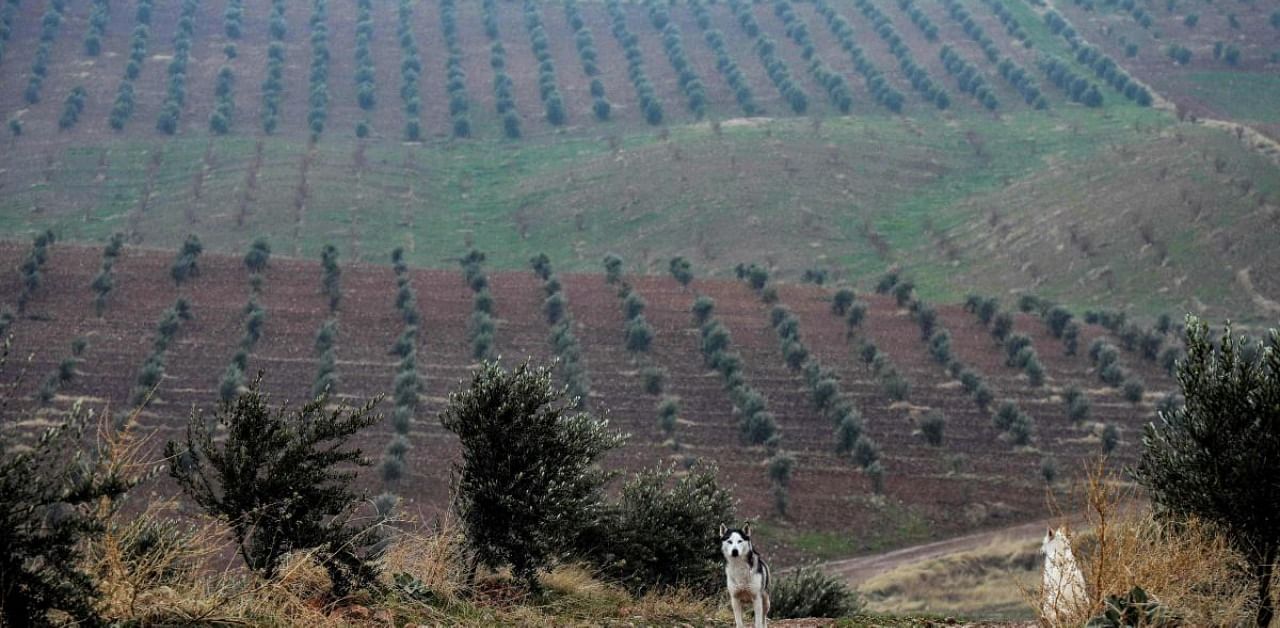
Tucked away in the rolling hills of Iraqi Kurdistan is a hidden treasure: tens of thousands of olive trees, thriving in a new homeland after being smuggled from neighbouring Syria.
Their branches are heaving with bright purple-black olives ready to be picked.
Their caretaker, Syrian Kurdish businessman Suleiman Sheikho, is proud to have brought the olive oil business to Iraq's autonomous north.
"This year was a good year," said 58-year-old Sheikho, who has been transporting trees from his native Afrin in northwest Syria into Kurdish Iraq since 2007.
"On this farm I have 42,000 olive trees, all of which I brought from Afrin when they were three years old," he told AFP, gesturing to neat rows reaching the horizon.
In early 2018, his mission took on a new urgency.
Turkey, which saw the semi-autonomous Kurdish zone of Afrin on its border as a threat, backed an offensive by Syrian rebel groups to take control of the canton.
The operation, dubbed "Olive Branch," displaced tens of thousands, many of whom had made their living for decades by producing olive oil in the area's mild climate.
Sheikho himself is a fourth-generation olive farmer and had 4,000 trees in Afrin that are older than a century.
The slender businessman, who once served as the head of Afrin Union for Olive Production, sprung into action.
He transported some of his trees legally, but smuggled others across the border, managed on both sides by autonomous Kurdish authorities.
Some of the new transplants joined his orchard, located among luxurious summer villas near the regional capital Arbil. He sold others to farmers across Kurdish Iraq.
Raw olives are a staple on Levantine lunch tables, while their oil is both used in cooking and drizzled on top of favourite appetisers like hummus.
The oil can also be used to make soap, while the dark, sawdust-like residue from olives pressed in the autumn is often burned to heat houses in winter.
Olive trees struggle in the blistering heat and desert landscapes of Iraq, so the yellowish-green oil was long imported at great expense from Lebanon, Syria or Turkey.
A domestic oil industry could change all that.
Sheikho was relieved to find the soil near Arbil as rich as in his hometown, but the warmer temperatures meant his trees required more robust irrigation networks.
There are two harvests a year, in February and November.
He built a press, where the olives are separated from twigs and leaves, pitted, then squeezed to produce thick, aromatic oil.
Dressed in a charcoal grey blazer during AFP's visit, Sheikho tested the quality by drinking it raw from the press, before the viscous fluid was poured into plastic jugs.
"For every 100 kilos of olives, I produced 23 kilos of olive oil," he told AFP.
Olive oil production had not taken root when Sheikho began working there, but has thrived since Syrians displaced by their country's nearly decade-long war began moving there.
According to the Kurdish regional government's (KRG) agriculture ministry, there were just over 169,000 olive trees in the Kurdish region in 2008.
Since then, the ministry invested some $23 million in planting and importing the trees, which now number around four million, it estimates.
There are around a half-dozen olive presses, employing many Syrian Kurds from Afrin.
Sheikho sees more fertile ground ahead.
"The farmers here have great ideas and they are extremely ambitious," he told AFP.
"With the hard work and experience of Afrin's farmers, they are going to create a very bright future for olive business."